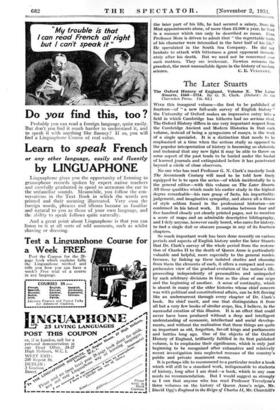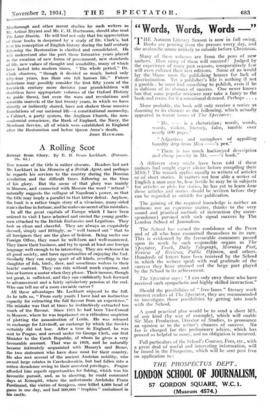The Later Stuarts
The Oxford. History of England. Volume X. The Later Stuarts, 1660-1714. By G. N. Clark. (Oxford : At the
Clarendon Press. 12s. 6d.)
.Wrin this inaugural volume—the first to be published of fourteen—of " a new full-scale survey of English history " the University of Oxford makes an impressive entry into a field in which Cambridge has hitherto had no serious rival. The Oxford History differs in one very important respect from the Cambridge Ancient and Modern Histories in that each volume, instead of being a symposium of essays, is the work of a single specialist. It is a distinction that needs to be emphasized at a time when the serious study as opposed to the popular interpretation of history is becoming so elaborate and technical that any new light it may be able to throw on some aspect of the past tends to be buried under the bushel of learned journals and extinguished before it has penetrated beyond a circle of close observers.
No one who has read Professor G. N. Clark's masterly book The Seventeenth Century will need to be told how finely equipped he is to open the series—of which incidentally he is the general editor—with this volume on The Later Stuarts. All those qualities which made his earlier study in the highest degree remarkable—his rare grasp of facts, his impartiality, judgement, and imaginative sympathy, and above all a fitness of style seldom found in the professional historian—are confirmed in his latest work. It contains between four and five hundred closely yet clearly printed pages, not to mention a score of maps and an admirable descriptive bibliography, and I defy anyone, however easily bored, who cares for history, to find a single dull or obscure passage in any of its fourteen chapters.
So much important work has been done recently on various periods and aspects of English history under the later Stuarts that Dr. Clark's survey of the whole period from the restora- tion of Charles II to the death of Queen Anne is particularly valuable and helpful, more especially to the general reader, because, by linking up these isolated studies and choosing from them the elements of each, it offers a compact and com- prehensive view of the gradual evolution of the nation's life, proceeding independently of personalities and unimpeded by such arbitrary divisions in time as the close of one reign and the beginning of another. A sense of continuity, which is absent in many of the older histories whose chief concern was with political and constitutional affairs, can be felt flowing like an undercurrent through every chapter of Dr. Clark's book. Its chief merit, and one that distinguishes it from all but a very few books of similar scope, lies, I believe, in the successful creation of this illusion. It is an effect that could never have been produced without a deep and intelligent understanding of economic, intellectual and social develop- ments, and without the realization that these things are quite as important as old, forgotten, far-off kings and parliaments and battles long ago. One of the objects of the Oxford History of England, brilliantly fulfilled in its first published volume, is to emphasize their significance, which is only just beginning to be recognized after exhaustive and relatively recent investigation into neglected recesses of the country's public and private muniment rooms.
It is perhaps idle to recommend to a particular reader a book which will still be a standard work, indispensable to students of history, long after I am dead—a book, which in any case needs no recommendation. But I would suggest as strongly as I can that anyone who has read Professor Trevelyan's three volumes on the history. of Queen, Anne's reign, Mr. . David Ogg's England in the Reign of Charles 1.1, Mr. Churchill's Marlborough and other recent studies by such writers as Mr. Arthur Bryant and Mr. C. H. Hartmann, should also read The Later Stuarts. He will find not only that his appreciation of those books is deepened by a study of Dr. Clark's, but that his conception of English history during the half century following the Restoration is clarified and consolidated. He will understand also the part those formative years played in the creation of new forms of government, new standards of life, new values of thought and sensibility, many of which have lasted into modern times. " The whole period," Dr. Clark observes, " though it decided so much, lasted only fifty-four years, less than one full human life." Future historians may possibly consider the first fifty years of the twentieth century more decisive (our grandchildren will doubtless have appropriate volumes of the Oxford History to guide them), but even the wars and revolutions and scientific marvels of the last twenty years, in which we have directly or indirectly shared, have not shaken those massive foundations of our national life—a constitutional monarchy, a Cabinet, a party system, the Anglican Church, the non- conformist conscience, the Bank of England, the Navy, the Merchant Service, all of which were established in England after the Restoration and before Queen Anne's death.
JOHN HAYWARD.















































 Previous page
Previous page